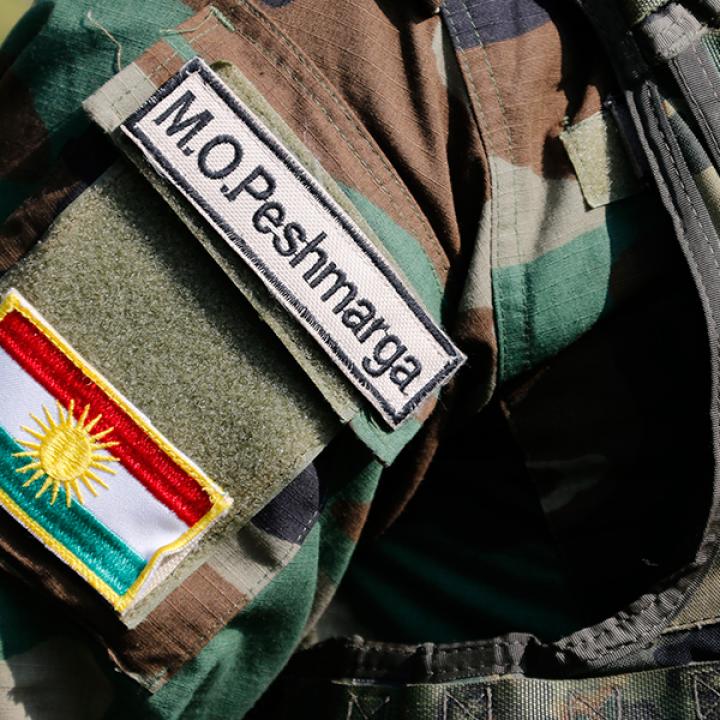

Although the scale and effectiveness of coalition efforts to train and equip the Peshmerga have grown, U.S.-Kurdish ties have yet to change fundamentally.
On July 12, the United States signed a memorandum of understanding with the Kurdistan Regional Government (KRG) regarding U.S.-Kurdish military cooperation in the next stage of the war against the self-styled Islamic State of Iraq and the Levant (ISIL, also known as ISIS).
On the Kurdish side, the agreement was signed by acting Minister of Peshmerga Affairs Karim Sinjari, and the U.S. side was represented by Elissa Slotkin, the acting assistant secretary of defense for international security affairs. After the agreement the Kurdish leadership met on July 14 with U.S. Central Command commander Gen. Joseph Votel, followed by a visit to Erbil by U.S. Secretary of Defense Ash Carter on July 24.
Battle on the Horizon
The meetings are a further indication that the battle of Mosul is fast approaching, and that the Iraqi Kurds are expected to play a critical role in the encirclement, liberation, and subsequent stabilisation of the city.
On the symbolic front, U.S. leaders have recently expressed gratitude for the sacrifices of the Peshmerga, who have suffered 1,466 killed, 8,610 wounded and 62 missing in their war against ISIL, according to a June 14 press release by the KRG. This was important because Kurdish leaders have often complained that the U.S. has shown a preference for arming and equipping the federal government's Iraqi army rather than the Peshmerga.
According to officials that I talked to on both sides of the deal, the agreement will also release new U.S. aid to the Ministry of Peshmerga Affairs. Though the KRG asked for $197m per month to cover incremental war costs, the Pentagon rationalised this figure down to around $60m. This is not an open-ended arrangement: It will only cover the operating expenses of the Peshmerga forces involved in the Mosul operation for the duration of their involvement, totalling around $415m. Military equipment also continues to flow into Kurdistan, including planeloads of German, U.S., French, British, and Hungarian munitions, weapons and non-lethal supplies.
But these imports are not "direct arming" of the Peshmerga of the kind called for by U.S. legislators, but blocked by the Obama administration in June 2015. Though aid is now being flown direct into the KRG, the manifests of aircraft are approved by the Iraqi Ministry of Defence.
Intensive Training
If anything is changing, it is the scale and effectiveness of the anti-ISIL coalition effort to train and equip the Peshmerga. Since January 2015 the coalition has run the Kurdistan Training Coordination Centre (KTCC), a 300-person training mission manned by German, Italian, British, Finnish, Dutch, Norwegian, Hungarian, and American troops. From January 2015 to April 2016 the KTCC trained nine sets of Peshmerga troops at five KRG bases, graduating roughly 500 troops each time. Though useful, this training was only four weeks long and mainly focused on squad- and platoon-level tactics involving fewer than 40 soldiers.
The new Modern Brigade Course (MBC) training offered since April 2016 is a big step forward. The training is 10 weeks long, allowing units to build greater skills and cohesion, and giving time for advanced training in battlefield life-saving, anti-tank operations and defence against chemical weapons. The MBC training also allows larger company-sized units -- of around 100 soldiers -- to practise coordinated operations in realistic urban warfare environments resembling Mosul. The two 600-men MBC courses that were completed so far have also seen the fielding of U.S. brigade equipment sets, as opposed to the mishmash of equipment used by previous sets of trainees.
Kurdistan is now receiving the equipment allocated under the KRG's $353.8m share of the $1.6bn Iraq Train and Equip Fund (ITEF) approved by the U.S. Congress in November 2014. Each MBC course sees the Peshmerga receive 36 mortars and around 160 tactical and engineering vehicles. Training is also being provided to maintain the new equipment.
What's After?
Yet while these steps are positive for the Kurds, it is harder to know whether the train-and-equip effort will be sustained after Mosul.
In one scenario the coalition packs up and goes home, leaving the Peshmerga once again isolated from international military assistance. This might be the preference of Baghdad and of regional players such as Iran. Indeed, Peshmerga spokesman Jabar Yawar was quick to refute the idea of permanent U.S. military bases in the KRG when he spoke to Rudaw on July 20, possibly mindful of sensitivities in Tehran and Baghdad. In another scenario -- for instance triggered by the election of a Kurd-friendly Donald Trump -- the U.S. security cooperation effort in Kurdistan could become even larger and more permanent.
For the Kurds, the only near-term option is to maximise the goodwill of international players by treading a fine line, supporting the Mosul battle while simultaneously reassuring regional actors in Tehran and Baghdad.
Michael Knights is a Lafer Fellow with The Washington Institute.
Al Jazeera



